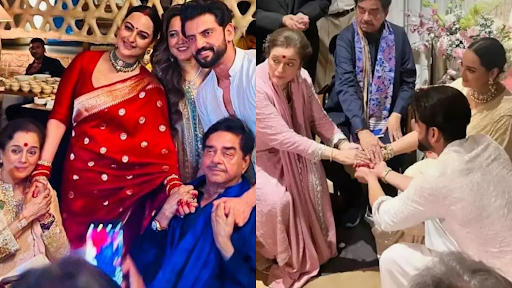Introduction
Marriage brings two people together in unison. It’s a journey filled with love, laughter, and togetherness. Challenges can arise when partners are from different religions.
Different beliefs and traditions can cause tension in relationships. It’s important to respect and understand each other. It builds a beautiful life.

Consider some thoughtful ways to handle these differences and create a harmonious, respectful relationship.
1. Open Communication
- Talk Early and Often:
Discussing your religious beliefs and practices openly and honestly is essential in an interfaith marriage. This dialogue sets the stage for mutual understanding and respect, allowing both partners to express their views and expectations regarding faith. By sharing and exploring each other’s beliefs, you lay the groundwork for a relationship built on empathy and awareness. This conversation helps clarify how your faiths will be integrated into your daily lives, from rituals and holidays to moral values and family traditions.
- Listen Actively:
Paying close attention to your partner’s experiences and feelings about their faith is crucial for developing a deep understanding and respect for their perspective. Take the time to listen actively when they share their thoughts and emotions related to their beliefs, and approach these conversations with empathy and openness. By understanding their perspective, you can better appreciate the role their faith plays in their lives and its significance to them.

2. Educate Each Other
- Share Knowledge:
Educating each other about your religious traditions, including holidays and rituals, is an important step in fostering mutual understanding and reducing potential misunderstandings.
Take the time to share the significance and practices associated with your respective faiths, explaining the meaning behind various holidays, ceremonies, and rituals. This exchange of knowledge can help clarify any misconceptions and build a deeper appreciation for each other’s beliefs.
- Attend Services Together:
Participating in your partner’s religious events is a meaningful way to show support and deepen your understanding of their beliefs. By actively participating in their traditions and celebrations, you demonstrate respect and commitment to their spiritual life.
This involvement allows you to experience their faith firsthand, fostering greater empathy and appreciation for their practices. It also provides an opportunity to connect more deeply with your partner on a personal and spiritual level, strengthening your relationship.
3. Respect Differences
- Honor each other’s beliefs:
Respect is key. You don’t need to agree with everything your partner believes. Acknowledging and respecting their beliefs is crucial for a strong relationship.
- Avoid Criticism:
Avoiding blame and negative comments about each other’s faith is crucial for maintaining harmony in your relationship. Finding fault or blaming your partner’s religious beliefs can lead to significant conflict and strain the relationship.
Instead, approach discussions about faith with genuine interest and openness, focusing on understanding and learning rather than judging. Show respect for your partner’s beliefs and express curiosity about their practices and values.

4. Find Common Values
- Identify shared values:
Focus on common values. Such as kindness, honesty, and love. These principles can meet different beliefs. And strengthen your bond and handle religious differences.
- Create New Traditions:
Combining religious aspects from both partners can be a meaningful way to create new traditions and enrich your shared life. By integrating elements from each religion, you foster a deeper understanding and appreciation of each other’s spiritual practices.
This approach not only strengthens your relationship but also allows you to develop unique traditions that honor both backgrounds. Embracing and blending these religious elements can lead to a more inclusive and harmonious environment where both partners feel their beliefs are valued and respected
5. Compromise and Flexibility
- Be willing to compromise:
Compromise is essential in any marriage. Whatever it is. It can occur when dealing with religious differences. Find solutions that work for both of you. Such as alternating holiday celebrations. And engaging in religious places.
- Stay Flexible:
To develop and nurture shared beliefs within a relationship, it’s crucial to remain adaptable and open-minded. Adjusting yourself to better understand your partner’s perspective fosters a deeper connection and strengthens the relationship.
6. Plan for the Future
- Discuss Children’s Upbringing:
If you plan to have children, discuss how you’ll handle their religious education. Will they be raised in one faith? or given the freedom to choose? Agreeing on this before can prevent conflicts later.
- Set boundaries with extended family:
Engaging in open conversations with your extended family about boundaries is essential for fostering mutual respect and maintaining a harmonious environment.
Clearly communicating your expectations and setting boundaries helps ensure that your family understands and respects your choices, particularly when it comes to sensitive matters like beliefs and values. It’s important to express these boundaries respectfully and assertively, explaining how you wish to navigate certain aspects of your life and relationships.
7. Seek Support Counselling and Mediation
- If religious differences are causing tension, consider reaching out to a marriage counselor. You can also visit any mediator who understands interfaith links.
They can offer practical strategies to handle conflicts and strengthen your bond. Seeking their guidance can help you find common ground. It allows you to build a more flexible relationship together.
- Join Interfaith Communities:
Engage with interfaith groups or communities. These spaces offer support and resources. And also build a sense of belonging for couples. Dealing with similar challenges.

Conclusion
Upbringing different religions in marriage. It requires open communication, respect, and compromise. Focus on shared values, educate each other, and stay flexible. It builds a strong, easy relationship that honors both backgrounds.
Remember, love and mutual respect are key to any successful marriage. No matter the religious differences.

